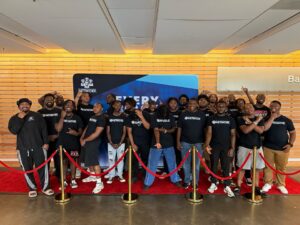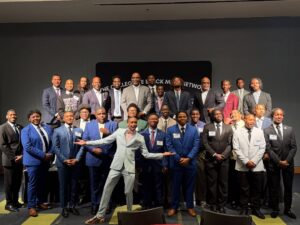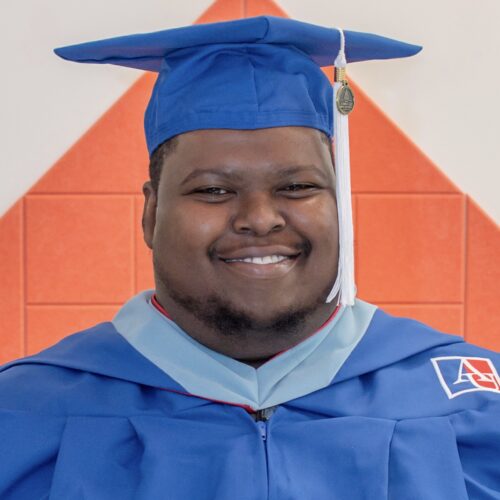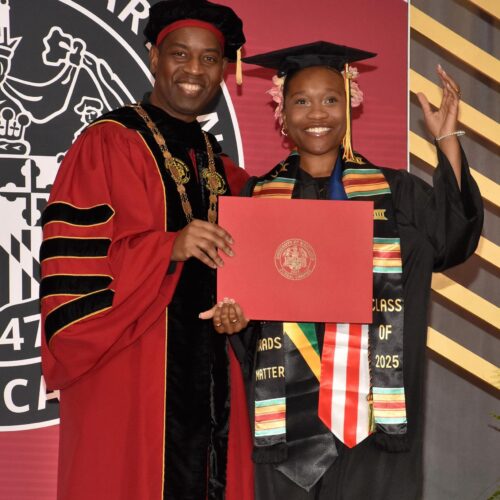Welcome to our Career Connections series, where we speak with Alumni who inspire us to build deep connections with our community, passion, and careers.
In 2020, PeerForward Alumni Darryl Hylton, Ed.D., and Jamie L. Enge, Ph.D., founded The Collegiate Black Male Network. Their nonprofit aims to increase the persistence and graduation rates of collegiate African American males through mentorship. In February, the organization celebrated 5 years of service with a gala, marking a major milestone.
Darryl Hylton Jr., a 2007 College Summit alum, currently serves as a Director of College Coaching for PeerForward Summer Workshops. His work with PeerForward is a small facet of his career; he serves as the President and Chief Executive Officer for The Collegiate Black Male Network as well as a Director of Student Success at the University of the District of Columbia.
Jamie Enge became a Peer Leader in 2004 at Illinois, Wesleyan. Now, he lends his talents to PeerForward as a Director of College Coaching. He currently works for the Chicago Public School District as a College and Career Equity Specialist and is a 2025 Surge Academy Fellow. When it comes to The Collegiate Black Male Network, he acts as the Vice President and Chief Operating Officer.
We caught up with Darryl and Jamie at one of our 2025 Washington College Workshops to discuss the work they are doing and why it’s so important to the communities they serve:
Tell me about The Collegiate Black Male Network how why the community you serve benefits from your care?

Darryl Hylton:
As an extension of my doctoral research where I looked at the impact of mentoring on the persistence and graduation rates of African American males in predominantly white institutions, The Collegiate Black Male Network was established to help colleges and universities increase the persistence and graduation rates of collegiate Black men.
“I recognized that there was not a dedicated space for black men to come and feel seen, heard, and valued as they matriculate toward their college degree.”
As we know, Black men have the lowest persistence in graduation rates amongst all racial and gender demographics. We wanted to be intentional in creating a space and opportunity for our Black men to thrive.
What about this work with The Collegiate Black Male Network makes you the proudest?
Jamie Enge:
In our 2030 strategic plan, one of the goals is ensuring that no less than 75% of our participants have a post-graduate success plan. That looks like ensuring that our young males graduating from colleges and postsecondary institutions and they have a viable path forward as well. That can consist of graduate school, further professional development, or employment.
“The way we utilize our skills to coach our young males is way bigger than just getting a degree.”
Honestly, it is way bigger than just getting a career or a job in their local community as well. With the extension of our executive board, which consists of graduates of our program, we have been able to broaden our horizons to explore workforce development and further education options for our young males. To date, 100% of our participants in the organization have found placement in less than six months following their graduations. This is huge. To have a 100% success rate is amazing and that is the proudest moment for us.
In your own words, what does a black male need to navigate higher education?

Darryl Hylton:
In a nutshell, black men need opportunity to navigate higher education, opportunities to be seen, the opportunity to be heard, and the opportunity to explore opportunities. Ultimately, they just need the opportunity. In many spaces, black men are not afforded the same resources, the same connections, the same networks as some of their counterparts, which may limit their ability to thrive and succeed not only during, but after graduation as well. Black men don’t need saving; they just need an opportunity.
Tell me the biggest milestone The Collegiate Black Male Network has achieved.
Jamie Enge:

We’ve been able to celebrate five years. It’s a huge milestone for us, especially as an organization that is prioritizing a high-need community. We’re not just saying that we are doing the work; we are actually doing the work. We have boots on the ground every single day. We are doing it in the way that is best for our young males, whether it’s text messages, whether it’s phone calls, whether it’s Zoom, whether it’s FaceTime calls. You name it; we are doing it. We are the front line of support for our young males nationwide. The Collegiate Black Male Network, it’s not just a DC thing. We have young males and alum all the way from California to Jamaica.
For us to be able to celebrate five years, it is a huge milestone. A lot of organizations do not stick around beyond that. Organizations that support Black males often do not stay around very long. We are blessed to be able to celebrate our five years. I’m very happy and proud to be able to do this work alongside my counterpart, Darryl, and the young males that we support through our service.
What would you say to black males pursuing a college degree?
Jamie Enge:
For me, I would say the space in which you may be looking for is The Collegiate Black Male Network. It does not require certain test scores or a specific GPA. What is required is for you to show up as your authentic self, and I’ll promise you we have it from there.
Darryl Hylton:
If I could share anything, I would share a quote from my speech that I delivered at our inaugural fundraising gala. It really is just a reminder to all the Black men across the world that, even through all the things that you’ve overcome, always remember that you are not your ancestors’ wildest dreams, you are the reality of their expectations.
Watch the Full Interview Below!
Some responses have been edited for length and clarity.












